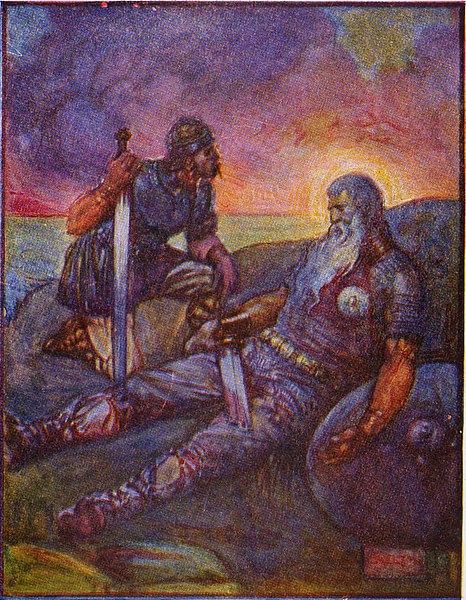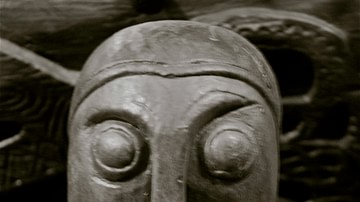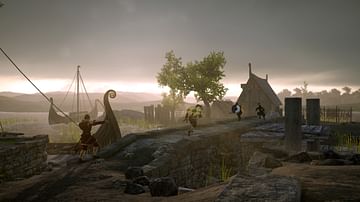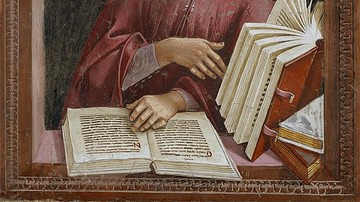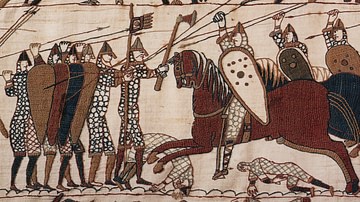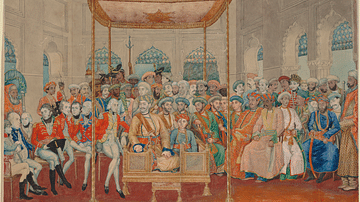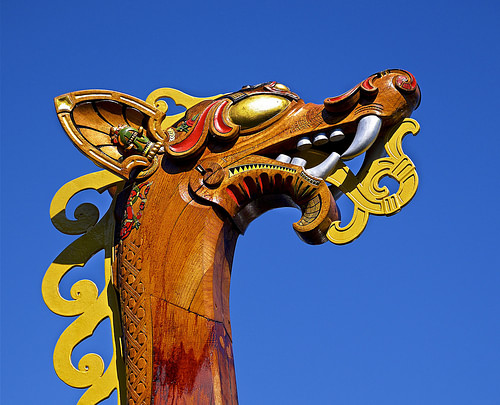
Beowulf is an epic poem composed in Old English consisting of 3,182 lines. It is written in the alliterative verse style, which is common for Old English poetry as well as works written in languages such as Old High German, Old Saxon, and Old Norse. Beowulf is considered one of the oldest surviving poems in the English language. The author of the poem is unknown and is generally referred to simply as the “Beowulf Poet.” The date of the poem's composition is also unknown. Arguments have been made for an origin as early as the 7th century CE. The poem concerns the legendary figure Beowulf, a hero of the Geats who were a North Germanic people inhabiting modern-day Gotaland in southern Sweden. Beowulf fights a series of monsters and also rules as King of the Geats for approximately 50 years.
Background & Historicity
The poem takes place in different parts of Scandinavia over the course of the 6th century CE. While the poem's protagonist and his deeds are legendary, historical figures and events are also described. Several characters mentioned in the poem also appear in other Old English or Scandinavian sources. For example, the raid by the Geatish king Hygelac into Frisia is mentioned by the 6th-century CE chronicler Gregory of Tours, who gives Hygelac's name as Chlochilaicus.
Many other figures, events, and places have parallels in Scandinavian sources. These include semi-legendary clans such as the Scyldings (Old Norse Skjoldungar) of Denmark and the Scylfings (also Ynglings or Old Norse Skilfingar) of Sweden, as well as several of their respective members. Characters such as Hrothgar, Eadgils, Hrothulf (Hrolf Kraki), and Othhere are all mentioned in other Scandinavian poetry and legend. Similarly, events such as the Battle of Finnsburg, the Battle on the Ice of Lake Vanern, and the aforementioned raid on Frisia by Hygelac are mentioned in other sources. Descriptions of these events in other sources have been used to date the events of the poem to the 6th century CE. Archaeological digs have also validated the descriptions of the burial sites of some of these semi-historical figures. Writers such as Snorri Sturluson (1179-1241 CE) described the locations of the burial mounds of kings such as Othhere and Eadgils. Several of these mounds have been excavated, revealing rich finds dating from the 6th century CE and seemingly validating these references in Beowulf and Norse Sagas.
The date of the poem's composition is unknown and is the subject of much debate. The surviving manuscript probably dates from either the late 10th century CE or the early 11th century CE. However, the poem itself may be much older. Arguments have been made for as early as the 7th century CE and as late as the 11th century CE. The poem was composed in England, though exactly where is uncertain. Some scholars have taken the poem's Scandinavian setting as evidence for an origin in the kingdom of East Anglia. The East Anglian royal house, the Wuffingas, seems to have had close ties to Sweden. This is evidenced by the Sutton Hoo ship burial. Arguments have also been made for an origin in the Kingdom of Wessex in the 9th century CE and for an origin in the early-11th-century CE court of Cnut, the Danish king who ruled Denmark, Norway, and England.
Plot Summary
Beowulf begins with a description of the life of Scyld Scefing (Old Norse Skjold), the legendary ancestor of the Scyldings or Danish royal family. The narrator then lists several descendants of Scyld before coming to Hrothgar, who rules from the hall of Heorot. Heorot may be identical to a 6th century CE hall excavated near Lejre in 2004-2005 CE. Beowulf and his thegns (retainers or soldiers) arrive at Heorot to assist Hrothgar against the monster Grendel. Grendel is described as a descendant of the biblical Cain and is an outsider among men. The narrator explains that the sounds of celebration and joy coming from Heorot actually agonize Grendel. Grendel begins attacking Heorot on a nightly basis, killing and devouring Hrothgar's warriors. Hrothgar and his people are depicted as helpless against the monster's attacks and Grendel ravages Hrothgar's hall for 12 years before Beowulf's arrival.
In off the moors, down through the mist bands God-cursed Grendel came greedily loping.The bane of the race of men roamed forth, hunting for prey in the high hall.(Beowulf, 710-13)
Beowulf hears about the plight of Hrothgar while at home in Geatland. He receives the permission of the Geatish king to travel with his warriors to Denmark and fight Grendel. Beowulf and his followers are welcomed by Hrothgar and his wife Wealtheow. Unferth, one of Hrothgar's warriors, is skeptical about Beowulf's abilities and the two fling insults at each other. On their first night in Heorot, Beowulf pretends to sleep while awaiting Grendel's inevitable arrival. When Grendel appears, Beowulf attacks him and they begin to grapple with each other but the swords of Beowulf's warriors are unable to pierce Grendel's skin. Finally, Beowulf is able to rip Grendel's right arm off and the monster flees the hall. The arm is hung up as a trophy and Beowulf's victory is celebrated.
Hanging high from the rafters where Beowulf had hung it, was the monster's arm, claw, and shoulder and all. (Beowulf, 833-836)
The following night, Heorot is again attacked. This time, it is Grendel's mother who has come, infuriated by the attack on her son. Grendel's mother drags Aeschere, Hrothgar's most trusted warrior, out of the hall and kills him. Aeschere's head is later found as Beowulf and the others are tracking Grendel's mother. Beowulf, Hrothgar, and the other warriors track Grendel's mother to her lair under a lake. The warrior Unferth presents Beowulf with his sword Hrunting and Beowulf makes preparations with Hrothgar should he be killed in the coming fight. Beowulf then plunges into the water and discovers a cave where Grendel and his mother have been living.
Beowulf: It is better for us all to avenge our friends, not mourn them forever. Each of us will come to the end of this life on earth. He who can earn it should fight for the glory of his name. Fame after death is the noblest of goals. Arise, guardian of this kingdom, let us go, as quickly as we can and have a look at this lady monster. (Beowulf, 1384-1391)
In the cave, Beowulf finds Grendel's body as well as the bodies of the men whom he and his mother have killed. Beowulf fights with Grendel's mother, but Unferth's sword cannot pierce her skin. In turn, Beowulf is protected against her attacks by his armor. Beowulf eventually finds another, magic sword at the bottom of the lake and uses it to behead Grendel's mother. The blade of his new sword is dissolved by the apparently toxic blood of the two monsters. He then takes their heads back to Hrothgar. In reward, Hrothgar showers Beowulf in gifts, including his ancestral sword Naegling. What follows is a lengthy speech by Hrothgar, urging Beowulf to remain humble and to be generous to his thegns. In essence, Hrothgar is espousing the proper behavior of a successful king and warlord. This would have reflected the values of the Anglo-Saxon aristocracy as well as their counterparts in the other early Germanic kingdoms.
Following this victory, Beowulf and his followers return to Geatland, where he becomes King of the Geats and rules for roughly 50 years. At the end of this period, an elderly Beowulf is forced to confront a rampaging dragon. The narrator explains that a slave stole a cup from the dragon's hoard at a place called Earnanaes. This prompts the furious beast to leave its lair and attack the countryside. The image of the dragon hoarding its treasure can be contrasted with generous kings and lords who properly reward their warriors and thegns for faithful military service. Beowulf and his soldiers arrive to fight the dragon but Beowulf demands to fight it alone and proceeds to battle with the monster. The dragon overpowers Beowulf and his men flee in terror. Only Wiglaf, described as a kinsman of Beowulf, remains to aid Beowulf. Together, Wiglaf and Beowulf kill the dragon, but Beowulf soon dies of his wounds.
Wiglaf: By almighty God, I'd rather burn than see flames swirling around my lord...I swear that nothing he ever did deserved an end like this, dying miserably and alone, butchered by this savage beast. (Beowulf, 2650-2652, 2656-2659)
Wiglaf retrieves the dragon's treasure at Beowulf's request and condemns his other followers for fleeing. Wiglaf is described as a cousin to Beowulf and as the last of the Waegmundings, who were the tribe of Beowulf's father. Beowulf himself is burned on a funeral pyre and then buried in a barrow overlooking the sea. Beowulf's people mourn his loss and are thrown into a panic for fear that they will no longer be adequately protected against attacks from neighboring peoples. No doubt this reflects a very real concern for people living in Anglo-Saxon England at the time of the poem's transcription.
For ten long days they made his monument, sealed his ashes in walls as straight and high as wise and willing hands could raise them...And the treasures they'd taken were left there too...Ground back in the earth. (Beowulf, 3159-3163, 3165-3167)
Themes
While the poem has a Christian veneer, the world of Beowulf and his contemporaries is decidedly pagan. The events of the poem take place long before the conversion of Scandinavia. The story takes place within the milieu of a decidedly Pre-Christian, Germanic warrior culture. Lords like Hrothgar and Beowulf hold lavish feasts, lead their respective warbands into battle, and reward their followers with treasure and gifts. These were the values of the ancient peoples of Scandinavia described in the poem, but they were also the values of the Anglo-Saxon nobility long after the arrival of Christianity.



